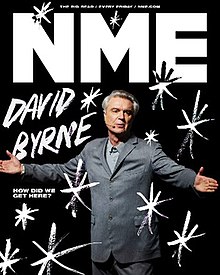NME
British music journalism website and former magazine / From Wikipedia, the free encyclopedia
Dear Wikiwand AI, let's keep it short by simply answering these key questions:
Can you list the top facts and stats about New Musical Express?
Summarize this article for a 10 year old
New Musical Express (NME) is a British music, film, gaming, and culture website[1] and brand. Founded as a newspaper in 1952, with the publication being referred to as a 'rock inkie',[2] the NME would become a magazine that ended up as a free publication, before becoming an online brand which includes its website and radio stations.[3][4][5]
This article may rely excessively on sources too closely associated with the subject, potentially preventing the article from being verifiable and neutral. (March 2023) |
 | |
 December 2020 cover of the digital issue, featuring David Byrne | |
| Categories | Music and pop culture media |
|---|---|
| Frequency | Weekly (1952–2018) Bimonthly (2023–present) |
| Founder | Theodore Ingham |
| Founded | 1952; 72 years ago (1952) |
| First issue | 7 March 1952 – 9 March 2018, 2023 – present (print) 1996 (online) |
| Company | NME Networks |
| Country | United Kingdom |
| Based in | London, England |
| Language | English |
| Website | www |
| ISSN | 0028-6362 |
As a 'rock inkie', NME was the first British newspaper to include a singles chart, adding that feature in the edition of 14 November 1952. In the 1970s, it became the best-selling British music newspaper. From 1972 to 1976, it was particularly associated with gonzo journalism[citation needed] then became closely associated with punk rock through the writings of Julie Burchill, Paul Morley, and Tony Parsons. It started as a music newspaper, and gradually moved toward a magazine format during the 1980s and 1990s, changing from newsprint in 1998.
The magazine's website NME.com was launched in 1996, and became the world's biggest standalone music site, with over sixteen million users per month.[citation needed] With newsstand sales falling across the UK magazine sector in the early 21st century, the magazine's paid circulation in the first half of 2014 was 15,830.[6] In September 2015, the NME magazine was relaunched to be distributed nationally as a free publication.[7] The first average circulation published in February 2016 of 307,217 copies per week was the highest in the brand's history, beating the previous best of 306,881, recorded in 1964 at the height of the Beatles' fame.[8] By December 2017, according to the Audit Bureau of Circulations, average distribution of NME had fallen to 289,432 copies a week,[9] although its then-publisher Time Inc. UK claimed to have more than 13 million global unique users per month, including 3 million in the UK.[10] In March 2018, the publisher announced that the print edition of NME would cease publication after 66 years and become an online-only publication.[11][12] However, this decision was reversed in 2023, with NME announcing that it would revive its print magazine as a bimonthly release.
NME was acquired in 2019 by Singaporean music company BandLab Technologies, which put all of its music publications under the NME Networks brand in December 2021, when the company was restructured.[13]